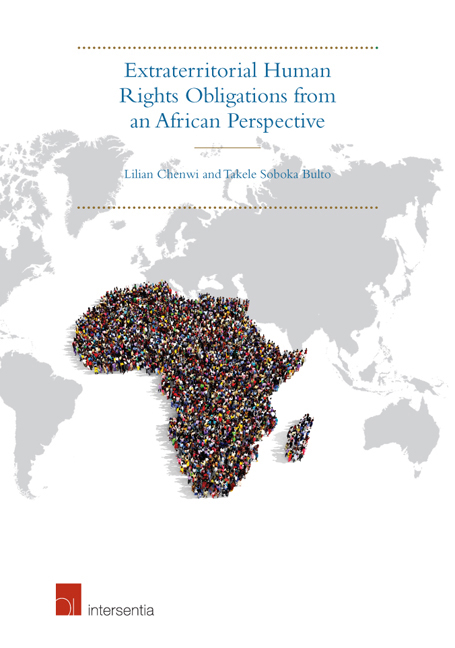Book contents
- Frontmatter
- Dedication
- Foreword
- Preface
- Contents
- List of Cases, Advisory Opinions and Other Decisions
- List of Treaties and Other Instruments
- About the Contributors
- Introduction
- Extraterritoriality in the African Regional Human Rights System from a Comparative Perspective
- Commercialisation of Educational Services and Extraterritorial Human Rights Obligations
- Extraterritorial Human Rights Obligations in the Context of Development Assistance to African States
- The Right to Food Beyond Borders: The Extraterritorial Reach of the Right to Food in Africa
- Extraterritorial Application of the Right to Water under the African System for the Protection of Human Rights
- Tortured Unity: United States–Africa Relations in Extraordinary Renditions and States’ Extraterritorial Obligations
- Indigenous Communities Displaced by Climate Change and Extraterritorial Application of States’ Obligations in Africa
- Land Grabbing, Extraterritorial Obligations and the Failure of Justice in Uganda: The Mubende Case
- Extraterritorial Obligations of Uganda for its Military's Failure to Respect and Protect Civilians in Areas of the Lord's Resistance Army Activity
- Bibliography
- Index
The Right to Food Beyond Borders: The Extraterritorial Reach of the Right to Food in Africa
Published online by Cambridge University Press: 21 September 2018
- Frontmatter
- Dedication
- Foreword
- Preface
- Contents
- List of Cases, Advisory Opinions and Other Decisions
- List of Treaties and Other Instruments
- About the Contributors
- Introduction
- Extraterritoriality in the African Regional Human Rights System from a Comparative Perspective
- Commercialisation of Educational Services and Extraterritorial Human Rights Obligations
- Extraterritorial Human Rights Obligations in the Context of Development Assistance to African States
- The Right to Food Beyond Borders: The Extraterritorial Reach of the Right to Food in Africa
- Extraterritorial Application of the Right to Water under the African System for the Protection of Human Rights
- Tortured Unity: United States–Africa Relations in Extraordinary Renditions and States’ Extraterritorial Obligations
- Indigenous Communities Displaced by Climate Change and Extraterritorial Application of States’ Obligations in Africa
- Land Grabbing, Extraterritorial Obligations and the Failure of Justice in Uganda: The Mubende Case
- Extraterritorial Obligations of Uganda for its Military's Failure to Respect and Protect Civilians in Areas of the Lord's Resistance Army Activity
- Bibliography
- Index
Summary
INTRODUCTION
In an increasingly interconnected world, actions or inactions by one state can have an impact on the realisation of rights, including the right to food, for people in another state. The agricultural and trade policies of one state can affect the price of agricultural goods on global markets, with devastating consequences for small-scale producers abroad. Transnational corporations, operating under the regulations of one state but working in another, can damage the environment, evict farmers or convert agricultural land away from food production. This can affect the availability and accessibility of adequate food for local populations. Despite the transnational nature of these consequences, the conventional conception of human rights – one that understands human rights as only applying between a state and those living within its borders – provides no accounting for the impacts of a state's policies abroad.
Over the past few years, drawing on the key international human rights instruments, norms and jurisprudence, legal scholars have sought to bring to the forefront the human rights obligations of states that extend beyond their borders. These obligations, most oft en referred to as extraterritorial obligations, require states to take seriously the human rights of people living in other countries when designing polices that may have an impact on them. The right to food, recognised in international law and domestically by a growing number of countries, is the right of all persons to feed themselves in dignity, either by producing or purchasing their food. With respect to the right to food, extraterritorial obligations require that states ensure their policies and actions do not have a negative effect on the ability of people living elsewhere to meet their food needs in dignity and that, in certain situations, states actively assist foreign populations in meeting their food needs. In these ways, extraterritorial obligations offer a very different frame by which to analyse and understand the impact of a state's actions and inactions outside of its borders. This frame is in stark contrast to the historical practice of international relations and cooperation in the area of food security, in which states have aided populations in foreign states with access to adequate food as an act of’ charity’ or, at most, a form of development assistance (oft en self-serving) – and not as a state obligation.
- Type
- Chapter
- Information
- Publisher: IntersentiaPrint publication year: 2018
- 1
- Cited by



